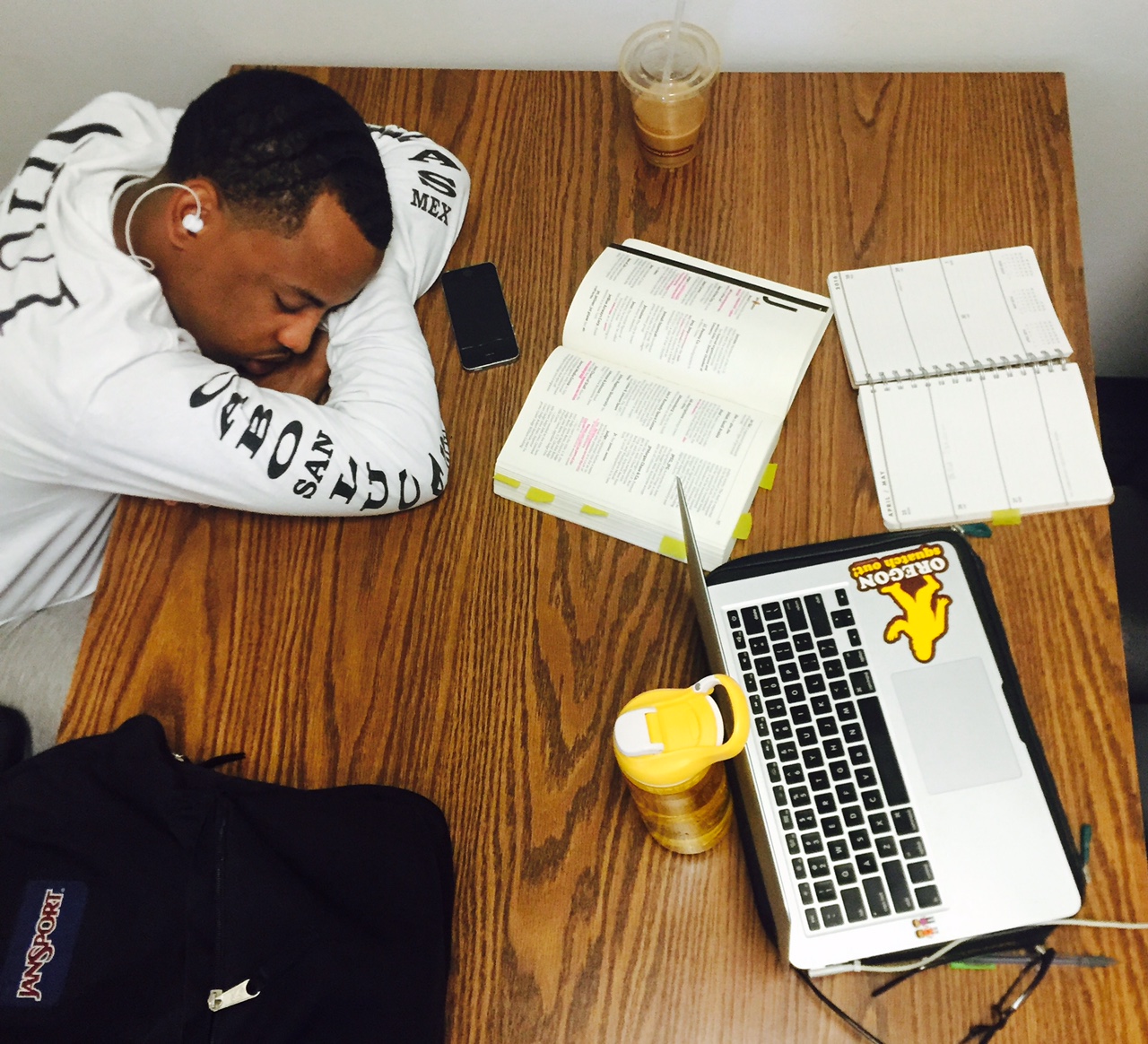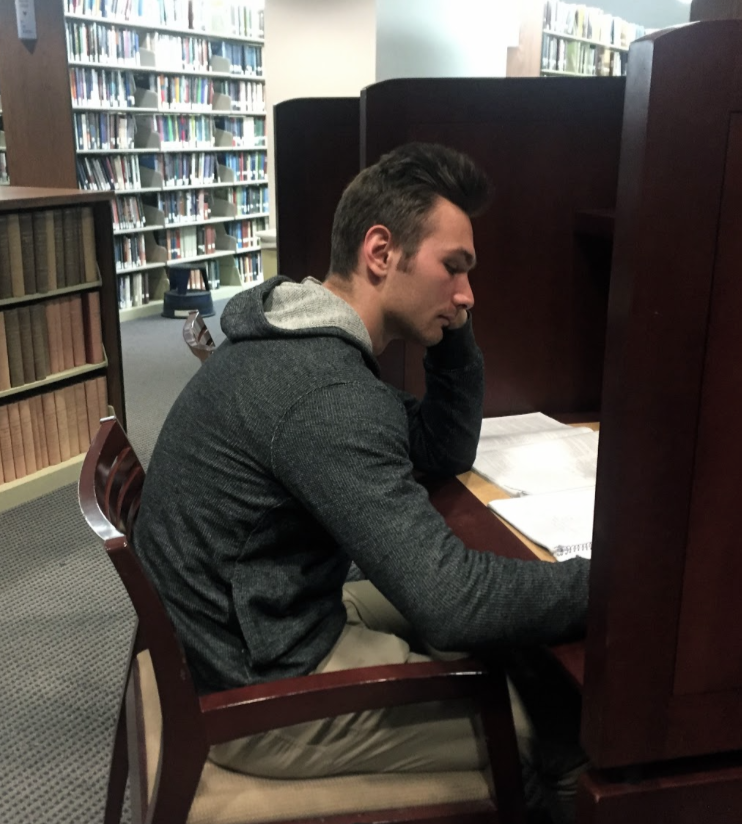
Counting sheep and catching Zs can be the last thing on a college student’s to do list. But skipping sleep may be doing detrimental harm to their productivity.
Students should sleep about seven to nine hours every night, according to the National Health Institute. A Pepp Post poll of about 130 students found that roughly half average no more than six hours of sleep a night. Any amount of sleep deprivation hurts the physical, mental and academic performance of the student, experts said.
“I think when it comes to balancing social life, sleep and school, you pick two and try to squeeze by on the last one, but one always drops off,” junior business major Kyle Gullikson said. “When it comes down to choosing two of them, I almost always choose socialize and school.”
Balancing classes, homework, spiritual life and extracurricular activities can lead to a busy life where 24 hours in a day is not enough, students said. All students reported being involved in more than one extracurricular, including Student Government Association, a cultural association, greek life or sports. Many also work or have an internship on top of classes.
“There is a lot of pressures on every aspect of my life,” said Colby Harriman, sophomore volleyball team member and international studies major. “Social life does not get a whole lot of emphasis. I feel like there are three major parts: school, athletics and family. You can only be great at two of those. Being an athlete does make sleep more of a priority. I try to nap a lot, but because I go to a really strenuous school academically and play a sport, there isn’t a whole lot of time for anything else.”
College students are more sleep deprived than the general population. About 28 percent of the general population sleep less than the suggested seven hours a night, according to a study done by the U.S. Department of Health and Human Services. About 50 percent of college students reported averaging less than seven hours of sleep a night, according to a Niche study of more than 800 college students nationwide.
That lack of sleep has an impact. In a survey of nearly 20,000 college students, about 90 percent of participants said they experienced regular sleepiness during their daytime activities in the seven days prior to taking the survey, according to the American College Health Association survey.
Is late night studying worth it?
It seems easy for busy college students to view sleep as a luxury, not a necessity. About 70 percent of Pepperdine students reported staying up all night at least once a semester, according to the Pepp Post poll. But studies show that studying all night might be worse for your grade.
“Sleep deprivation results in memory, attention and concentration deficits, mood instability and negatively impacts our problem-solving abilities,” Louis Cozolino, a professor at Pepperdine Graduate School of Education and Psychology, wrote in an email.
Sleep is “by the brain and for the brain,” without it the brain cannot work properly, Cozolino wrote. While the body sleeps, the brain makes certain connections to strengthen long-term memory. In almost all studies related to memory and learning, brain functions always improved for those who had seven to nine hours of sleep.

“If I am getting less than six hours of sleep multiple days in a row then it’s going to start affecting my functioning,” junior psychology major Alexandra Little said. “I am a night person, staying up late to study is preferred than waking up early to study.”

Why does the body need sleep?
Lack of sleep not only affects how a student feels the next day, but it can have serious, long-term consequences. Some students may feel that less than seven hours of sleep is adequate, but their body is actually sleep deprived.
Students that sleep an average of six hours or less, even for one or two days, begin to collect a sleep debt that leaves the body functioning as if the student has not slept for a full day or two, according to the National Institutes of Health.
“The mental and physical performance of a student who sleeps five to six hours is 30 percent less than those who sleep seven to nine,” Dr. Luis Vidaurri, an eye surgeon and owner of an optometry clinic, said. “Students underestimate the importance of sleep because of their immaturity. Over time, this decrease in (sleep) links to depression, anxiety and mental fatigue.”
Sleep deprivation also results in many physical side effects such as sickness, weight gain and hormone imbalance, Vidaurri said. There is also an increased risk of heart disease, diabetes, cancer and a shorter life expectancy. Lack of sleep can also lead to eye spasms, dry eye and heighten the risk of poor vision earlier in life.
Scroll over this infograph to see the impact of sleep deprivation on the body.
“I think sleep is a big problem for college students,” Dr. Lucy Larson, Pepperdine Student Health medical director, said. “… It helps with not only physical, but cognitive health. It is very important that students get the right amount of sleep. They need it.”
Is sleep deprivation here to stay?
Some students might wonder if sleep deprivation will continue once they enter the workforce. The good news is that it does not have to.
Students have classes, homework, extracurricular activities and internships, said Kimberly Bernstein, an industry specialist in law, government, education, science, healthcare and technology at the Pepperdine Career Center. These activities require more of a student’s free time than the workplace.
“There have been many times in college where I’ve gone days without sleeping more than five hours just to finish an assignment or cram for an exam,” Karlton Spencer, senior international business major, said. “Managing classes, social life, work and every other aspect of college life is hard.”
Certain professions, such as investment banking or law, come with long hours outside of work, but most jobs do not require many hours outside an eight to five work day, Bernstein said. Depending on the work environment, one is expected to answer to a company or boss during the work day and then go home.
“It is just being aware of the path you are going down,” Bernstein said. “It is just about lifestyle. I think as a student it’s a little bit less of what you choose, but what you are given. I think once you go into the workforce your actual duties lesson.”
What can students do to get more sleep?
Students might view healthy sleeping habits as a challenge, but they can also be rewarding. Students who discover what sleeping tricks work best can gain academic, physical and mental benefits.
“Student sleep is a topic of lecture every time we go to our annual student health conference,” Arleen Fernandez, registered nurse at the Student Health Center, said. “It is a problem. Especially because people are out of their homes and are going through a readjustment period.”
For a good night’s rest, Pepperdine students should reserve their bed only for sleeping, Fernandez said. The brain becomes more active when it is time to sleep for those who study, eat and watch television in bed. People who use their bed only for sleep fall asleep faster and sleep deeper.
In order to reduce noise and distractions, students should ask the people they live with to respect their sleeping schedule, Fernandez said. It is important to not interrupt the sleeping process.
Relaxation techniques such as a student closing one’s eyes and going on a peaceful “mental walk” until falling asleep can also be helpful, Fernandez said. Another helpful technique is to tense your muscles and then release them from head to toe while breathing deeply.
“I would say this past year falling asleep has been pretty tough,” Angelica Khar, junior business administration major, said. “How I am able to fall asleep though is by not looking at my phone before bed, dimming my lights, not watching television and reading a book.”
Juliette Moody completed this story in Dr. Christina Littlefield’s spring 2016 Jour 241 class.



